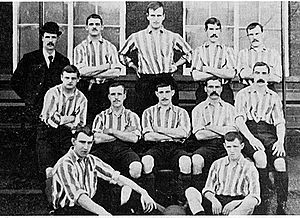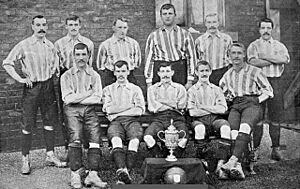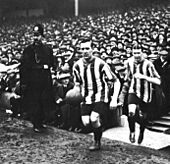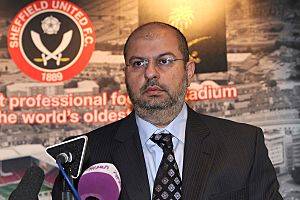History of Sheffield United F.C. facts for kids
The history of Sheffield United Football Club, an English football club from Sheffield, began when the club was formed in 1889.
Contents
How Sheffield United Started
Sheffield United Football Club was created on March 22, 1889, at Bramall Lane. It was suggested by Sir Charles Clegg, who was the president of the Sheffield United Cricket Club. Clegg was a well-known local sportsman and also the chairman of Sheffield Wednesday. Sheffield Wednesday used to play at Bramall Lane but left after a disagreement about rent. To make up for the lost money, the Cricket Club decided to start a football team, and that's how Sheffield United began.
The cricket club itself had been at Bramall Lane since 1854. It was the first English sports club to use "United" in its name because several smaller local clubs had joined together to survive.
The football team was formed just six days after a huge crowd of 22,688 people watched an FA Cup semi-final at Bramall Lane. Charles Stokes, a member of the ground committee, saw how much money a football team could make. So, Sheffield United became a professional club almost right away.
They played their first game on September 7, 1889, against Notts Rangers, losing 4–1. Their first game at Bramall Lane was on September 28, 1889, against Birmingham St George's, which they also lost 4–0.
United's first season was mostly friendly matches and local cup games. They did well in their first FA Cup attempt, beating Football League side Burnley 2–1 at home. However, their next cup game against Bolton Wanderers was a huge 13–0 defeat. This made the club realize they needed to play in a regular league.
They joined the Midland Counties League for the 1890–91 season, finishing fifth. This was also the first time they wore red stripes on their shirts, after playing their first season in all-white. They then played in the Northern League the next season, finishing third. At the end of that season, they applied to join the Football League First Division but were instead accepted as one of the first twelve teams in the Second Division.
The Early Success Years (1890s–1930s)
Sheffield United quickly made an impact, getting promoted to the First Division in 1892–93. They finished second and won their promotion match against Accrington 1–0.
United stayed in the top league for an amazing 37 seasons in a row, which is still a record for a newly promoted team! They won the League Championship in 1897–98. They also finished as runners-up in 1896–97 and 1899–1900. After winning the League Championship, United played and won an unofficial "Champions of Great Britain" title against Celtic, who had won the Scottish League.
They won their first FA Cup Final on April 15, 1899, beating Derby County 4–1. They returned to the FA Cup Final in 1901, playing Tottenham Hotspur. The game was a 1–1 draw, and Spurs won the replay 3–1.
United were back in the FA Cup Final the very next year, on April 19, 1902. They drew 1–1 with Southampton, but the replay a week later saw the Blades win 2–1.
Their next final appearance was on April 24, 1915, when United beat Chelsea 3–0 to win "The Khaki Cup final." This was the last game before football competitions were stopped for the First World War.
The fourth and final FA Cup win came at their first Wembley Cup Final, beating Cardiff City 1–0 on April 25, 1925. Their last FA Cup Final appearance was on April 25, 1936, where they lost 1–0 to Arsenal.
Ups and Downs (Late 1930s - 1950s)
After many years in the top division, Sheffield United were relegated for the first time in 1934. One reason for this was selling their star striker, Jimmy Dunne, to Arsenal. Dunne had scored over 140 goals for the club in just six seasons. He scored 41 goals in the 1930–31 season, which is still a club record.
In the 1920s, United had some huge wins, including a 10–0 home victory against Burnley in 1930, and an 11–2 win against Cardiff City in 1926.
They almost got promoted back to the First Division in 1936 and 1938, finishing third in the Second Division both times. But in 1939, they finally succeeded, beating local rivals Sheffield Wednesday to second place. They started the 1939–40 season well, but then World War II stopped the league.
After the war, football leagues restarted. United had won a regional competition in 1945–46. They continued this good form, finishing sixth in the First Division and reaching the FA Cup Quarter-finals in the next season.
However, this good period didn't last. The club was relegated again in 1948–49. The following season, they just missed out on instant promotion when Wednesday beat them to second place by a tiny difference in goal average.
After a few mixed seasons, Joe Mercer became manager and led the Blades to win the Second Division Championship in 1952–53, scoring 97 goals. But after two tough seasons in the top league, Mercer died, and the club was relegated again in 1956.
A New Era (1960s–Mid 1970s)
John Harris became manager in 1958. He had a strong team with talented local players like Joe Shaw (who played over 600 games) and Alan Hodgkinson, a young goalkeeper who played for England. The team was always close to promotion and had good cup runs. They finally got promoted in 1961, finishing second to Ipswich Town. That same season, they reached the FA Cup semi-finals.
Sheffield United had a fantastic run in 1971, winning promotion from Division Two. The next season, they started the First Division incredibly well. Led by players like Tony Currie and Alan Woodward, they went unbeaten for their first ten league games, winning eight and drawing two. They had an unbeaten streak of 22 matches in total. Their first loss in Division One was against Manchester United at Old Trafford on October 2, 1971, losing 2–0.
Because of this success, a decision was made to build a new stand at Bramall Lane, which was mostly a three-sided stadium. This new stand, called 'The South Stand', opened in 1975.
Tough Times (Late 1970s–Late 1980s)
Sadly, the new stand opened just as the team's performance dropped. Despite finishing sixth in Division One that season, they were relegated to the Second Division in 1976. This relegation caused big financial problems for the club.
The club struggled, and managers changed often. In 1978–79, they were relegated again, this time to the Third Division. This was the first time United had ever been outside the top two divisions. They started the 1980–81 season well, but then manager Harry Haslam had to step down due to health issues. 1966 World Cup winner Martin Peters took over, but the team's form collapsed, and they were relegated to the Fourth Division. This relegation happened after a missed penalty kick in the final game of the season.
Having reached their lowest point, United appointed Ian Porterfield as manager. With new money from the board, United became Fourth Division Champions in 1982, setting a new record of 92 points (as wins now counted for 3 points). Keith Edwards was their top scorer with 35 goals.
United struggled a bit in the Third Division at first, but in 1983–84, they cruised into the top 3 and earned another promotion to Division 2. This was their second promotion in three seasons! Keith Edwards was again the top scorer.
In the Second Division, United tried to get promoted again in 1985–86. Manager Porterfield signed experienced players, which led to the team being nicknamed "Dad's Army." However, injuries and bad results caused problems, and Porterfield was sacked.
Billy McEwan took over, but star player Keith Edwards left for Leeds United. The team's results continued to be mixed, and McEwan resigned in January 1988 after a heavy 5–0 home defeat.
The Dave Bassett Era (1988–1995)
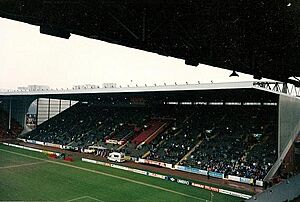
Dave Bassett became manager on January 21, 1988. The club was soon relegated to the Third Division. But Bassett then led them to two promotions in a row! They were back in the First Division for the 1990–91 season. Bassett's signings of Tony Agana and Brian Deane were key, as they both scored over 20 goals.
The next season, United battled with rivals Leeds United for the top spot. United earned promotion on a great day at Leicester, winning 5–2. They also reached the quarter-finals of the FA Cup, losing to Manchester United.
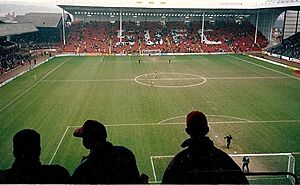
From 1990, Sheffield United spent four seasons in the top division of English football, including the first two Premier League seasons. In 1990–91, they didn't win any of their first 17 league games but then made an amazing comeback to stay in the division. In 1991–92, they finished an impressive ninth, qualifying for the new Premier League.
Brian Deane scored the very first Premier League goal on August 15, 1992, five minutes into a 2–1 home win over Manchester United. Despite being in the relegation zone for much of the first half of the season, they played like a top team in the second half. They also knocked Manchester United out of the FA Cup, reaching the semi-finals before losing to local rivals Sheffield Wednesday.
Brian Deane was sold in 1993, and the Blades struggled to score goals in 1993–94. They were relegated on the final day of the season. In 1994–95, they finished eighth in Division One, not enough for a playoff spot. By December 1995, Bassett left as manager.
Chasing Promotion (1995–2006)
Howard Kendall replaced Dave Bassett in November 1995. He stayed for 18 months. In 1997, Sheffield United missed a chance to return to the Premiership by losing 1–0 to Crystal Palace in the playoff final.
Over the next two and a half years, the club had three different managers and reached the FA Cup semi-final again in 1998. In December 1999, Neil Warnock took over. The club was in a lot of debt, so Warnock focused on cutting costs. His first three seasons ended with mid-table finishes.
The 2002–03 season was exciting for Sheffield United. They reached the semi-finals of both the FA Cup and League Cup, losing to Premiership clubs Arsenal and Liverpool. They also reached the Division One playoff final but lost 3–0 to Wolverhampton Wanderers.
In 2003–04 and 2004–05, Sheffield United just missed out on the playoffs for promotion, finishing eighth both times.
The 2005–06 season was their twelfth straight year in the second tier of English football. After a strong season, United secured promotion back to the Premiership on April 15, 2006, after many years of trying.
A Season in the Premier League
Sheffield United finished 18th in the Premiership and were relegated back to the Championship after just one season.
They won ten games that season. Their 2–1 home win against Middlesbrough on September 30 was their first Premiership victory since 1994. Their top scorer was Rob Hulse with eight goals.
On March 17, 2007, Hulse broke his leg during a game, which affected the team's performance. On the last day of the season, May 13, Sheffield United played Wigan Athletic at home. They needed to avoid defeat to stay in the Premiership but lost 2–1. This meant Wigan stayed up because their goal difference was slightly better. Also, West Ham United won their game, which meant United were relegated.
Sheffield United later challenged their relegation in court, arguing that West Ham should have had points deducted over player transfers. West Ham was fined instead. United's appeal failed, and they started the 2007–08 season in the Championship. They later received compensation from West Ham.
More Relegations and Promotions (2007–Present)
Neil Warnock resigned after the relegation. Bryan Robson took over but was sacked in February 2008. Kevin Blackwell then became manager and improved the team's form.
On May 25, 2009, Sheffield United played Burnley in the Championship Play-Off final but lost 1–0, meaning they stayed in the Championship.
The 2010–11 season was tough. Kevin Blackwell was sacked, and Gary Speed took over but left to manage Wales. After more manager changes, Sheffield United were relegated to League One on April 30, 2011.
After relegation, Danny Wilson became manager. They just missed out on automatic promotion that season, finishing third. They lost in the playoffs to Huddersfield Town. Wilson left in 2012–13, and they reached the playoffs again but lost to Yeovil Town.
David Weir was appointed manager but was dismissed after a very poor start to the 2013–14 season. Nigel Clough took over, and the team improved, finishing seventh. They also had a great run to the FA Cup semi-finals, losing to Hull City. The 2014–15 season was similar, with strong cup runs and a fifth-place finish in League One. However, they lost in the playoffs, and Clough was dismissed. Nigel Adkins became manager, but the 2015–16 season was disappointing, with the club finishing eleventh, their lowest league finish since 1983. Adkins' time as manager was cut short after just one year.
Back to the Premier League
Former player Chris Wilder was appointed manager in 2016. After a slow start, he turned the team around. The club stayed in the top two places from mid-November and secured a return to the Championship on April 8, 2017. On April 15, they won the League One title. Sheffield United became the fourth club to win all four tiers of professional English football. They finished the season with a club record 100 points.
In September 2013, Prince Abdullah bought a 50 percent share in United's parent company. Later, in 2017, the co-owner Kevin McCabe tried to buy Prince Abdullah's share or sell his own. Prince Abdullah chose to buy, but McCabe refused to sell, leading to a legal battle.
In the 2018–19 season, Sheffield United earned automatic promotion to the Premier League. Many people thought they would be relegated, but they finished an impressive ninth place in their first season back. In September 2019, after a long legal fight, the High Court decided that McCabe's company had to sell its shares. So, Prince Abdullah became the only owner of the club.
In the 2020–21 season, the club had a very bad start, winning only one of their first eighteen matches. Wilder left the club in March 2021. Paul Heckingbottom became caretaker manager but couldn't stop relegation at the end of the season. In May 2021, Slaviša Jokanović became the first overseas manager for the club. However, he was dismissed in November 2021 after a poor start, and Heckingbottom was reappointed permanently.
The 2021–22 season saw them finish fifth in the Championship, losing in the play-off semi-finals. In the following season, Heckingbottom guided United back to the Premier League, securing automatic promotion with a second-place finish. The team also reached the F.A. Cup Semi-final, losing to Manchester City at Wembley Stadium.
United's return to the Premier League for the 2023–24 season was difficult. By early December, the team was at the bottom of the league. The club's board decided to sack Paul Heckingbottom and replaced him with former Blades manager, Chris Wilder.
 | DeHart Hubbard |
 | Wilma Rudolph |
 | Jesse Owens |
 | Jackie Joyner-Kersee |
 | Major Taylor |


